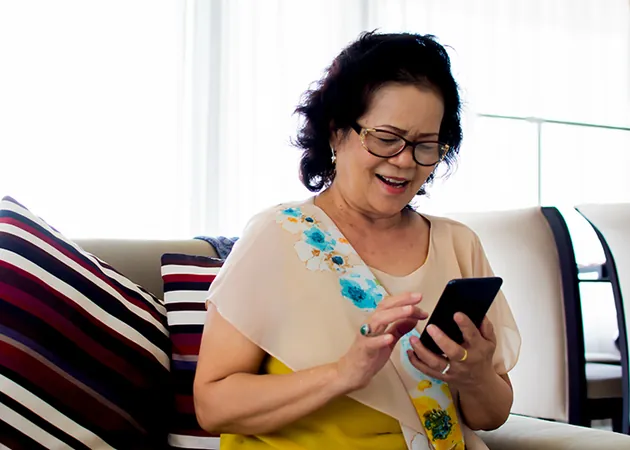
Groundbreaking NIH-Funded Study Set to Revolutionize Support for Latino Dementia Caregivers with Innovative Text Messaging Program!
2024-11-20
Author: Jia
Introduction
In the complex world of dementia care, caregivers often bear the weight of their loved ones' struggles without receiving adequate support themselves. Dubbed 'invisible second patients,' these caregivers face immense emotional and physical burdens that significantly affect their own well-being. Alarmingly, statistics reveal that nearly half of all family caregivers in the United States caring for someone with dementia experience depression or anxiety symptoms.
Disparities Among Latino Caregivers
Among Latino communities, this issue compounds, as they face not only a higher prevalence of dementia but also increased rates of depression compared to their non-Latino white counterparts. 'Latinos already have a higher prevalence of depression, which tends to worsen over time,' explained Jaime Perales Puchalt, Ph.D., MPH, an assistant professor of neurology at the University of Kansas Alzheimer's Disease Research Center. These disparities can largely be attributed to social determinants of health, including limited access to healthcare and fewer resources for caregiver support.
CuidaTEXT: A Groundbreaking Initiative
In response to this urgent need, Dr. Perales Puchalt leads a pioneering initiative supported by a $4 million grant from the National Institutes of Health (NIH) to test a novel text messaging support intervention called CuidaTEXT. This trailblazing program is the first of its kind, specifically designed to provide assistance to Latino caregivers responsible for individuals with dementia. An English-language counterpart known as CareTEXT is also available.
Program Goals and Features
CuidaTEXT aims to alleviate caregiver stress by sending daily automated text messages packed with valuable insights on dementia care, navigating end-of-life discussions, prioritizing self-care, and accessing social support. Users can reply with specific keywords to receive targeted information and participate in live coaching sessions for tailored assistance with their unique challenges. The program's design promotes the dual goal of enhancing the caregiver’s health while ensuring quality care for those living with dementia.
Preliminary Study Findings
Early research from a preliminary study published in 2022 involving a small group of 24 Latino caregivers indicated promising results—participants reported high usability and noticeable improvements in their mental health, including reduced levels of depression and distress.
Expansive Upcoming Study
The upcoming expansive study will involve 288 Latino family caregivers from across the United States and Puerto Rico, focusing on those aged 18 and older exhibiting depressive symptoms, as measured by the Center for Epidemiologic Studies Short Depression Scale (CESD-10). Participants will be recruited through various channels, including community outreach, clinics, flyers, and social media campaigns. They will be divided into two groups: one will have access to the CuidaTEXT program, while the control group will not receive the intervention until the study concludes.
Study Structure and Goals
Those in the CuidaTEXT group will receive daily messages over six months, along with tailored texts for their specific needs. Mental health evaluations will be conducted at the study's outset, three months in, and again at six months, with an additional follow-up at seven months. Researchers expect caregivers who participate in CuidaTEXT to experience greater reductions in depressive symptoms and distress compared to the control group.
Investigating Coping Strategies
Notably, the study will investigate whether CuidaTEXT encourages healthier coping strategies among participants, including proactive problem-solving and adaptive perspectives on their caregiving roles. This approach could empower caregivers to feel more prepared and better equipped to handle the challenges of dementia care.
Future Aspirations
Should the results support their hypothesis, indicating that CuidaTEXT effectively reduces psychological distress and enhances coping mechanisms, the research team envisions rolling out the program on a national scale. Dr. Perales Puchalt emphasized the potential for widespread accessibility: 'It needs to be offered at a national level by multiple community-serving entities so that everyone can use it.' If successful, this groundbreaking approach could change the landscape of caregiver support for Latino families, enabling them to thrive even in the face of difficult challenges.
Conclusion
Stay tuned for updates on this impactful study that could reshape how society supports its 'invisible second patients!'





 Brasil (PT)
Brasil (PT)
 Canada (EN)
Canada (EN)
 Chile (ES)
Chile (ES)
 España (ES)
España (ES)
 France (FR)
France (FR)
 Hong Kong (EN)
Hong Kong (EN)
 Italia (IT)
Italia (IT)
 日本 (JA)
日本 (JA)
 Magyarország (HU)
Magyarország (HU)
 Norge (NO)
Norge (NO)
 Polska (PL)
Polska (PL)
 Schweiz (DE)
Schweiz (DE)
 Singapore (EN)
Singapore (EN)
 Sverige (SV)
Sverige (SV)
 Suomi (FI)
Suomi (FI)
 Türkiye (TR)
Türkiye (TR)